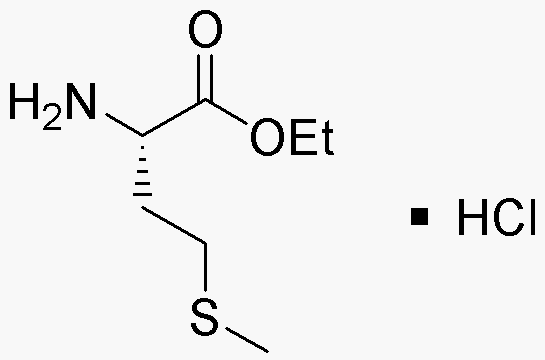L-Methionine ethyl ester hydrochloride is widely utilized in research focused on:
- Nutrition Supplements: This compound is often used in dietary supplements to enhance protein synthesis and support muscle recovery, making it popular among athletes and fitness enthusiasts.
- Pharmaceuticals: It serves as a precursor in the synthesis of various pharmaceuticals, particularly those targeting liver health and detoxification, providing a natural way to support metabolic processes.
- Animal Feed: In the agriculture sector, it is added to animal feed to improve growth rates and overall health in livestock, ensuring better yield and quality of animal products.
- Cosmetics: The compound is incorporated into skincare products for its antioxidant properties, helping to protect skin cells from damage and promoting a healthier appearance.
- Research Applications: It is frequently used in biochemical research to study protein interactions and metabolic pathways, providing insights that can lead to new therapeutic strategies.
General Information
Properties
Safety and Regulations
Applications
L-Methionine ethyl ester hydrochloride is widely utilized in research focused on:
- Nutrition Supplements: This compound is often used in dietary supplements to enhance protein synthesis and support muscle recovery, making it popular among athletes and fitness enthusiasts.
- Pharmaceuticals: It serves as a precursor in the synthesis of various pharmaceuticals, particularly those targeting liver health and detoxification, providing a natural way to support metabolic processes.
- Animal Feed: In the agriculture sector, it is added to animal feed to improve growth rates and overall health in livestock, ensuring better yield and quality of animal products.
- Cosmetics: The compound is incorporated into skincare products for its antioxidant properties, helping to protect skin cells from damage and promoting a healthier appearance.
- Research Applications: It is frequently used in biochemical research to study protein interactions and metabolic pathways, providing insights that can lead to new therapeutic strategies.
Documents
Safety Data Sheets (SDS)
The SDS provides comprehensive safety information on handling, storage, and disposal of the product.
Product Specification (PS)
The PS provides a comprehensive breakdown of the product’s properties, including chemical composition, physical state, purity, and storage requirements. It also details acceptable quality ranges and the product's intended applications.
Certificates of Analysis (COA)
Search for Certificates of Analysis (COA) by entering the products Lot Number. Lot and Batch Numbers can be found on a product’s label following the words ‘Lot’ or ‘Batch’.
*Catalog Number
*Lot Number
Certificates Of Origin (COO)
This COO confirms the country where the product was manufactured, and also details the materials and components used in it and whether it is derived from natural, synthetic, or other specific sources. This certificate may be required for customs, trade, and regulatory compliance.
*Catalog Number
*Lot Number
Safety Data Sheets (SDS)
The SDS provides comprehensive safety information on handling, storage, and disposal of the product.
DownloadProduct Specification (PS)
The PS provides a comprehensive breakdown of the product’s properties, including chemical composition, physical state, purity, and storage requirements. It also details acceptable quality ranges and the product's intended applications.
DownloadCertificates of Analysis (COA)
Search for Certificates of Analysis (COA) by entering the products Lot Number. Lot and Batch Numbers can be found on a product’s label following the words ‘Lot’ or ‘Batch’.
*Catalog Number
*Lot Number
Certificates Of Origin (COO)
This COO confirms the country where the product was manufactured, and also details the materials and components used in it and whether it is derived from natural, synthetic, or other specific sources. This certificate may be required for customs, trade, and regulatory compliance.


